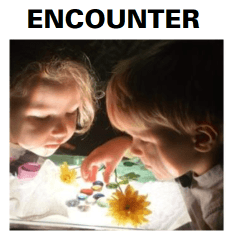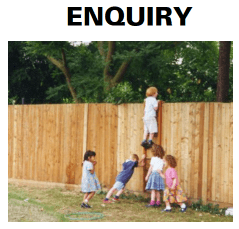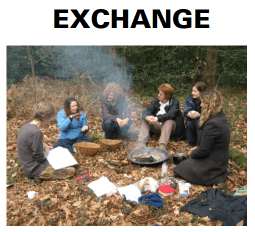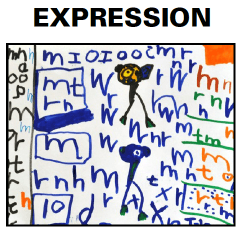Learning is What We Do Together
Co-constructing learning in the English EYFS - an introductory course
The English EYFS Statutory requirements have four overarching principles – unique child, positive relationships, enabling environments with teaching and support from adults, who respond to their interestsand needs and help them build their learning over time.
Children and adults construct the curriculum together: practitioners….build on children’s motivations and interests to support and extend their development and learning. The curriculum is co-constructed between children, practitioners and families. Children bring funds of knowledge-based interests to the setting, and they are motivated to learn through connecting new experiences to what they already know and can do.
Birth to Five Matters 2021 p.39
This introductory four-session course focusses on working with principles and characteristics of social co-constructive early childhood education pedagogy in relationship to these statutory requirements and related non-statutory guidelines. It provides an opportunity for educators to develop their practice, expertise and capacity to build environments in which children’s learning flourishes. It is founded upon building learning environments of ENCOUNTER, ENQUIRY, EXCHANGE, EXPRESSION




Using examples from Sightlines Initiative reference projects work available on the Birth to Five Matters resource library, and from our long-standing experience of the work of Reggio Emilia’s preschools, the course will discuss:
- Understanding and enabling co-construction;
- Exploring processes of enquiry;
- Being responsive & responsible educators;
- Building your reflective systems.
It is ideal for managers, nursery heads and teams of educators who are actively developing their pedagogy together.
Everybody knows that early years’ educators can be creative, critical and reflective; that young children are creative, strong, powerful learners, and that educators and children thrive in creative enabling environments … It’s very difficult to turn beliefs, values and aspirations into practice … there’s a gap between what we want to do and what actually happens. This work is designed for everybody who wants to bridge that gap.
Mary Jane Drummond, Early Childhood Education Consultant
SEMINAR OUTLINES
SESSION ONE Wednesday 13th October 4 - 5.30p.m.
This session will explore what it can mean to ‘construct curriculum together.’ We will unpick the values and principles that underpin co-constructive pedagogies of teaching and learning and explore how educators might develop strategies for working this way with both children and colleagues to build strong, resilient learning communities. We will consider the importance of the image of the child as rich and competent (Malaguzzi), developing understandings and knowledge through shared encounters, the exchange of ideas and their relationships with others and with the world around them. Through examples of practice, we will focus on the innate socialness of learning, highlight the importance of listening to children, of tuning into their interests and ways of learning and responding in ways that respect children’s innate curiosity and desire for connection.This session will explore what it can mean to ‘construct curriculum together.’ We will unpick the values and principles that underpin co-constructive pedagogies of teaching and learning and explore how educators might develop strategies for working this way with both children and colleagues to build strong, resilient learning communities. We will consider the importance of the image of the child as rich and competent (Malaguzzi), developing understandings and knowledge through shared encounters, the exchange of ideas and their relationships with others and with the world around them. Through examples of practice, we will focus on the innate socialness of learning, highlight the importance of listening to children, of tuning into their interests and ways of learning and responding in ways that respect children’s innate curiosity and desire for connection.
SESSION TWO Wednesday 3rd November 4 - 5.30p.m.
In our second session we will explore the nature of enquiry through critical examination of chosen examples of early years documentation, and investigate ways in which these are developed and sustained through reflective cycles. We will consider how environments can support and promote children’s enquiries, and how the characteristics of effective learning from the EYFS are crucial aspects of this way of working. We will explore how enquiries might develop from children’s interests but also from their encounters with the natural world and from events, provocations and invitations that are of interest to them. Educators will consider ways that enquiries can be launched and relaunched, re-presented and revisited so that children get multiple opportunities to deepen their understandings and rehearse and refine the skills they have learned.In our second session we will explore the nature of enquiry through critical examination of chosen examples of early years documentation, and investigate ways in which these are developed and sustained through reflective cycles. We will consider how environments can support and promote children’s enquiries, and how the characteristics of effective learning from the EYFS are crucial aspects of this way of working. We will explore how enquiries might develop from children’s interests but also from their encounters with the natural world and from events, provocations and invitations that are of interest to them. Educators will consider ways that enquiries can be launched and relaunched, re-presented and revisited so that children get multiple opportunities to deepen their understandings and rehearse and refine the skills they have learned.
SESSION THREE Wed. 17th November 4 - 5.30p.m.
Our third session looks at the skills and strategies of the educator. We will consider when and how adults take up positions in front, behind and beside children in their learning and the multiple and complex roles of facilitators, observers and knowledgeable others who share skills and knowledge to support children’s investigations. We will explore how we might create the classroom as a studio, plan encounters, engage children in groups and ensure that the requirements of the seven learning areas of the EYFS are integrated, exist in connection with each other and are rooted in meaningful experiences. In particular we will consider the importance of developing children’s 100 languages (Malaguzzi) in order to investigate and express their ideas and understandings.Our third session looks at the skills and strategies of the educator. We will consider when and how adults take up positions in front, behind and beside children in their learning and the multiple and complex roles of facilitators, observers and knowledgeable others who share skills and knowledge to support children’s investigations. We will explore how we might create the classroom as a studio, plan encounters, engage children in groups and ensure that the requirements of the seven learning areas of the EYFS are integrated, exist in connection with each other and are rooted in meaningful experiences. In particular we will consider the importance of developing children’s 100 languages (Malaguzzi) in order to investigate and express their ideas and understandings.
SESSION FOUR Wednesday 1st December 4 - 5.30p.m.
This last session considers how educators can develop a research-based approach to developing their practice through sharing experiences and engaging in professional dialogue together. We will return to the concept of learning together and the necessary enabling structures and strategies which sustain this and enable professional dialogue to flourish. This includes developing capacities of critical reflection and the use of pedagogical documentation to enhance children’s learning and open it up for discussion with families and the wider community. Finally, we will seek ways of staying in connection as a group to sustain ourselves and each other in alternative ways of working and resisting the pressure of transmissive paradigms.This last session considers how educators can develop a research-based approach to developing their practice through sharing experiences and engaging in professional dialogue together. We will return to the concept of learning together and the necessary enabling structures and strategies which sustain this and enable professional dialogue to flourish. This includes developing capacities of critical reflection and the use of pedagogical documentation to enhance children’s learning and open it up for discussion with families and the wider community. Finally, we will seek ways of staying in connection as a group to sustain ourselves and each other in alternative ways of working and resisting the pressure of transmissive paradigms.
Dates, Details & Booking
| Date | Wednesday 13th October 2021 |
| End Date | Wednesday 1st December 2021 |
| Cut off date | Tuesday 12th October 2021 |
| Available places | 0 |
| Price | £140 |
| Member Discount | 10% |
| Group Discount |
2 - 3 people = £125 p.p. 4 - 8 people = £120p.p. Please enquire regarding larger groups. Discount is calculated during Group Registration process. |
| Presenters |
Dr. Christine Merrick Robin Duckett Liz Elders |
| Please Note: |
Seminar Dates: The online platform will be Zoom: the link will be issued on the previous working day. You can download the information pdf below and share with colleagues. |
| Times | Wednesdays @ 4 - 5.30pm |
| Location/Map | online |
| Download info | Learning is What We Do Together - introduction to co-constructive edn in EYFS 2021.pdf |
Group Rate
| #Registrants | Rate/Person (£) |
|---|---|
| 2 | 125 |
| 3 | 125 |
| 4 | 120 |
| 5 | 120 |
| 6 | 120 |
| 7 | 120 |
| 8 | 120 |

